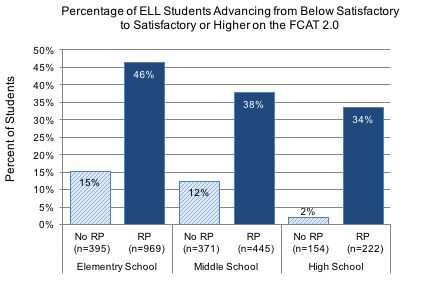
Purpose of Study:
Reading Plus was widely used in Florida’s Miami-Dade County School District during the 2013-2014 school year. Among those using the program were many students designated as English Language Learners (ELLs) and receiving English for Speakers of Other Languages (ESOL) services. The purpose of this study was to determine the effects of Reading Plus reading practice on the scores ELL students achieved on the reading portion of the Florida Comprehensive Assessment Test 2.0 (FCAT). At the time, this was the standardized state test administered to all Florida public school students in grades three through ten.
Study Design:
Included in the study were ELL students for whom valid 2013 and 2014 FCAT scores were available (n = 46,171). Among these were 12,845 students who were on English Proficiency Levels 1-4 and receiving ESOL services. The remaining 33,326 ELL students had received ESOL services previously but no longer did so because they had attained English proficiency.
Changes in FCAT scores and levels over the course of one year were examined in relation to English Proficiency Levels and the amount of reading practice students engaged in. The latter was quantified in terms of the number of reading practice lessons completed.
Key Results:
At the elementary, middle, and high school levels, ELL students who engaged in more Reading Plus practice (e.g., 100 or more ~15-minute lessons) achieved significantly larger scale score gains on the reading portion of the FCAT and were significantly more likely to advance to a higher level on the FCAT; e.g., from below satisfactory to satisfactory or above. The largest FCAT score and level gains were seen among ELL students with lower initial levels of English proficiency.
Within the Reading Plus program, ELL students who engaged in more reading practice also achieved significantly larger reading rate gains and were more likely to advance to higher levels of text complexity while continuing to demonstrate good comprehension.
These results indicate that the Reading Plus program is an effective tool for developing reading proficiency in ELL students.

